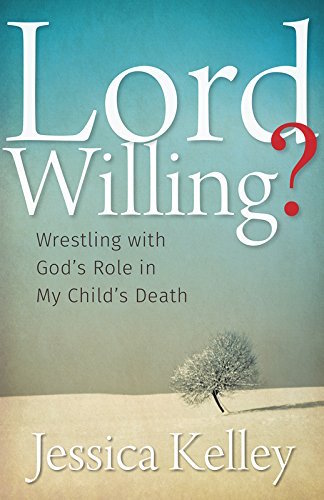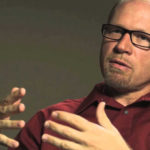We run our website the way we wished the whole internet worked: we provide high quality original content with no ads. We are funded solely by your direct support. Please consider supporting this project.

Lord Willing?
Lord Willing? Wrestling with God’s Role in My Child’s Death, by Jessica Kelley
In November 2012, I received one of the most touching emails I have ever received. A young mother named Jessica Kelley explained to me that her four-year-old son had been diagnosed with an aggressive brain tumor. Despite his parents’ and doctors’ valiant attempts to find a cure, Henry was now quickly approaching death. I recall getting a lump in my throat when Jessica and her husband, Ian, wondered if I would be willing to videotape a short eulogy to be played at Henry’s funeral. I was humbled when Jessica explained that my sermons and books had helped her and Ian frame Henry’s tragic illness and impending death in a way that made sense to them and that brought much comfort. More than that, Jessica wanted people attending Henry’s funeral to hear about a way of envisioning God and of understanding tragedies that she expected most had never heard before.
To say I was honored is a massive understatement. To prepare my eulogy, I called Jessica a short while later. I wanted to get to know her a little bit and to learn more about the story leading up to the email. Jessica informed me that, until about a year before Henry became ill, she had assumed that everything that came to pass, including the suffering of little children, happened by divine design. Most Christians do. Somehow, even the most nightmarishly painful events supposedly fit into God’s mysterious plan, and somehow all these things “glorify” him.
After a period of intensive study, however, Jessica and Ian began to embrace a very different perspective. Jessica expressed to me the tremendous comfort she derived from knowing God was not in any sense behind her precious little boy’s suffering during the last year of his tragically short life. So, in the midst of her own grieving, Jessica was hoping God might use the death of her child to give others a glimpse of the true God, who is always unequivocally on the side of life and is never in any sense involved in killing.
Even as I listened to Jessica tell her story over the phone during our first conversation, I had a strong sense that there was something very special about this young woman. I was not only profoundly moved by the poignancy of her story, but I was stunned by the almost lyrical way she spontaneously expressed it. Yet, I was even more amazed by the depth and insight of her theological reflection and by how articulately she verbalized it—and this while death was closing in on her precious son! My appreciation for Jessica’s communication skills only deepened as I got to know her and Ian over the following two years, which is why I began to encourage Jessica to consider putting her story, and her theological reflections, into a book.
Three years later, this book has arrived. While I expected Jessica’s book would be great, I never dreamed it would be as remarkable as it turned out to be! I have spent a good portion of my life in books, and I honestly have never encountered anything quite like Lord Willing? Never have I witnessed such profound theological insights and such tightly reasoned theological arguments woven together with such a masterfully written and emotionally impacting narrative—a narrative that frequently borders on poetry. Frankly, you are not likely to read another book that makes you cry as hard as this one. And most readers are not likely to read many books that make them think as hard than this one. But what most sets this book apart is that no one is likely to ever read a book that does both the same time!
Seriously, it’s almost like Jessica has created a completely new genre with this work. We might call this genre, “Emotionally Gripping Theology”!
Whether or not you currently struggle with the question of why a world that is ruled by an all-good God contains so much suffering, I assure you that you will find Lord Willing? to be a tremendous gift in your life. For wherever you are at, this book will impact you, change you, and stretch you in beautiful ways. And, most importantly, it will give a picture of an unfathomably beautiful God and empower you to find this God, even in the face of life’s most nightmarish tragedies.
I simply could not possibly recommend a book more strongly than I do this one.
Category: General
Tags: Death, Jessica Kelley, Problem of Evil, Suffering, Warfare Worldview
Topics: The Problem of Evil
Related Reading

Divine Wisdom
Why doesn’t God end it all and stop the slaughter? Why does God allow suffering and evil to go on so long? Here, Greg offers two possible answers to these questions. Option A is that all evil somehow is designed by God and somehow brings glory to him. But Greg thinks Option B is a better explanation, and it involves…

Does God Still Heal?
In the ancient world Jesus was known first and foremost as an exorcist and a healer. These two activities are mentioned in every summary of Jesus’s ministry found in the Gospels. It’s common for Western Christians today to accept that infirmities (sickness, disease, injuries, disabilities and deformities) are part of God’s mysterious plan for their…

Why Can’t God Stop Evil? The Thomas J. Oord Interview (podcast)
Greg and Thomas talk about Open Theism and how Greg’s views differ from Thomas’s. Theology nerds, get your compass and your flashlight and prepare to go DEEEEEP in the weeds! Thomas’s book: God Can’t Episode 487 http://traffic.libsyn.com/askgregboyd/Episode_0487.mp3

Aslan Roars: The Atonement as Spiritual Warfare
Greg begins to unpack the Christus Victor view of the atonement by comparing it to the Chronicles of Narnia.

The Call to Suffer
Paul tells us that in all our relations, we are to “have the same attitude of mind Christ Jesus had” (Phil 2:5). Though he was “in very nature God,” he didn’t cling to this status. Rather, for our sake he set aside his divine prerogatives, took on the nature of a servant and “humbled himself…

Podcast: Does Evil Really Exist?
Greg considers the idea that evil is simply the privation of good. He then offers a better explanation. http://traffic.libsyn.com/askgregboyd/Episode_0116.mp3
